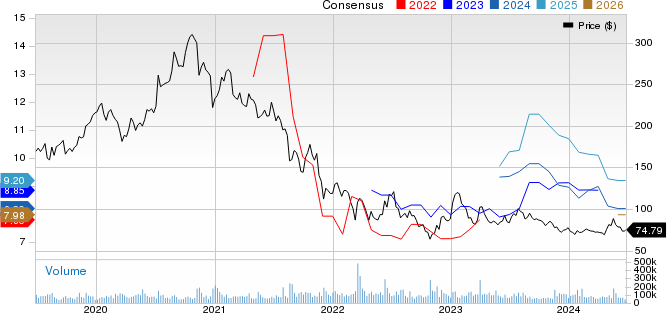Alibaba (BABA) Boosts Generative AI Efforts With AI Programmer
Alibaba BABA is leaving no stone unturned to boost technological innovation driven by generative AI. In the fourth quarter of fiscal 2024, AI-related revenues witnessed a triple-digit growth year-over-year.
Building on this momentum, Alibaba’s cloud division, Cloud Intelligence Group, recently unveiled the “AI programmer,” powered by the company’s in-house large language model (LLM).
The AI programmer combines software architect, development engineer, and test engineer roles to help developers shorten application development times, sometimes to minutes.
Alibaba aims to gain solid popularity among individual and corporate developers on the back of the AI programmer.
Moreover, this launch has added strength to Alibaba Cloud Intelligence Group’s overall portfolio.
Alibaba Group Holding Limited Price and Consensus

Alibaba Group Holding Limited price-consensus-chart | Alibaba Group Holding Limited Quote
Growing Generative AI Efforts Aid Alibaba Cloud
Per a Statista report, the generative AI market is expected to hit $36.06 billion in 2024 and reach $356.10 billion by 2030, exhibiting a CAGR of 46.5% between 2024 and 2030. Alibaba is well-positioned to capitalize on this solid growth opportunity on the back of its expanding generative AI-backed offerings.
Alibaba recently launched Qwen2.5, an upgraded version of its family of LLMs, Tongyi Qianwen. Qwen2.5 offers significant improvements in reasoning, code comprehension, and textual understanding, demonstrating competitive results to programmers.
Alibaba also updated Model Studio, its AI model and application development platform, to offer a wider range of models and sophisticated AI tools. Developers can now access over one hundred models from AI companies like Baichuan AI, and the platform also incorporates an open-source framework for application development.
Alibaba’s launch of its AI programming assistant, Tongyi Lingma, remains noteworthy. It enhances software development efficiency, reducing test code implementation time by over 70% and saving developers hours of manual work.
These efforts to strengthen its generative AI-backed portfolio are expected to continue driving Alibaba Cloud Intelligence Group’s performance. In the fourth quarter of fiscal 2024, the segment generated revenues of RMB 25.6 billion ($3.5 billion), up 3% from the year-ago quarter.
Stiff Competition Hurts Alibaba
However, Alibaba faces stiff competition in the generative AI market against players like Microsoft MSFT, Amazon AMZN and Alphabet GOOGL, which are making concerted efforts to strengthen their dominance in the market.
Recently, Microsoft introduced new generative AI and data solutions for retailers, enabling personalized shopping experiences, empowering store associates, and unifying retail data. These solutions include Azure OpenAI Service copilot templates, retail data solutions in Microsoft Fabric, Dynamics 365 Customer Insights copilot features and Retail Media Creative Studio.
Meanwhile, Amazon is riding on its AI-powered assistant, Amazon Q, allowing conversations, problem-solving, content generation, and insights. It connects to company information repositories, code, data, and enterprise systems, promoting task efficiency, decision-making and innovation.
Alphabet’s Google is capitalizing on the increasing demand for large language models with its most powerful AI model, Gemini. Solid momentum in Google’s Vertex AI, which enables developers to train, tune, augment and deploy applications using generative AI models, is another positive.
Conclusion
Alibaba’s shares have declined 1.4% in the year-to-date period, underperforming the industry’s return of 16.1%. BABA’s shares have underperformed Microsoft, Amazon and Alphabet’s gain of 19.5%, 22.1% and 28.4%, respectively, in the year-to-date period.
Unfavorable estimate revision is also noteworthy. The Zacks Consensus Estimate for BABA’s fiscal 2025 earnings is pegged at $8.20 per share, indicating a 4.9% decline from the year-ago reported figure. The figure has decreased by 1.1% in the past 60 days.
Despite the stiff competition, Alibaba is benefiting from its growing generative AI efforts, strong momentum across its international commerce retail and wholesale businesses, and expanding China's wholesale commerce business. These factors are expected to continue driving its top-line growth in the near term.
The Zacks Consensus Estimate for 2025 total revenues stands at $138.63 billion, indicating year-over-year growth of 6.2%.
Alibaba currently carries a Zacks Rank #3 (Hold). You can see the complete list of today’s Zacks #1 Rank (Strong Buy) stocks here.
Want the latest recommendations from Zacks Investment Research? Today, you can download 7 Best Stocks for the Next 30 Days. Click to get this free report
Amazon.com, Inc. (AMZN) : Free Stock Analysis Report
Microsoft Corporation (MSFT) : Free Stock Analysis Report
Alphabet Inc. (GOOGL) : Free Stock Analysis Report
Alibaba Group Holding Limited (BABA) : Free Stock Analysis Report


